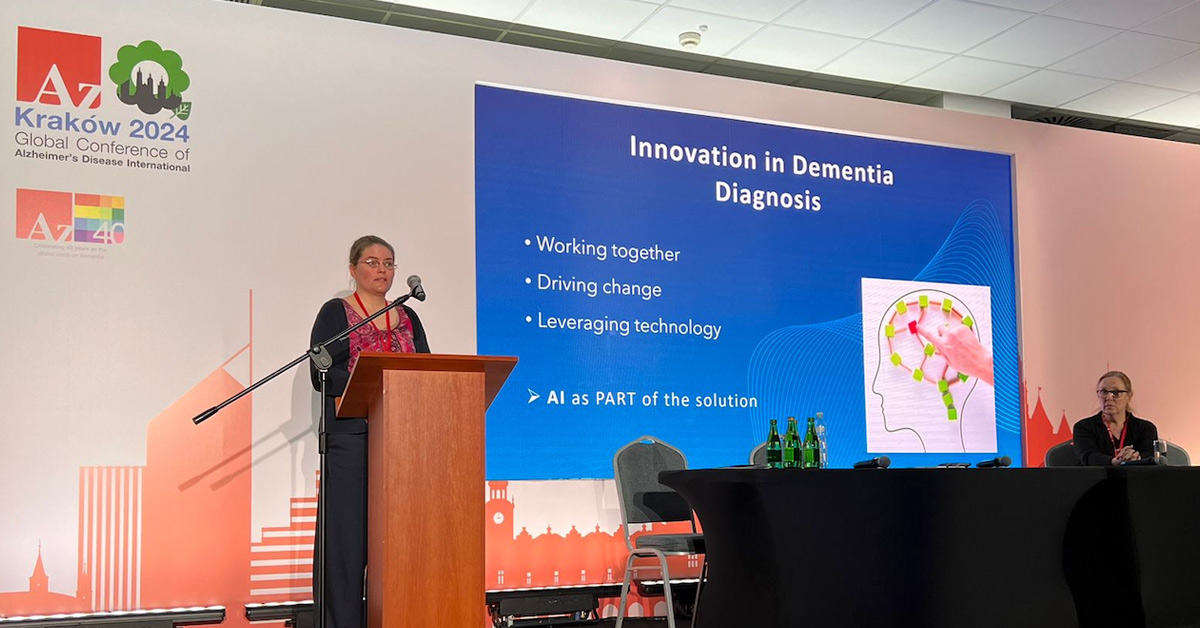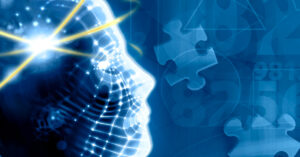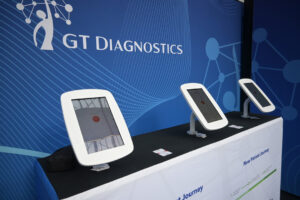Rethinking Alzheimer’s: Stories of Strength and Innovation
In a recent conference session titled “Rethinking Alzheimer’s: Stories of Strength and Innovation,” Linda Sommerlade, Head of Operations at GT Diagnostics, delivered a compelling presentation on the advancements and future possibilities in diagnosing and managing Alzheimer’s disease. The session highlighted innovative approaches and the potential of technology to transform the patient journey, offering new hope to those affected by this challenging condition.
Embracing Technological Advancements for Early Diagnosis
Linda began by sharing a video of interviews that highlighted the significant gap in current diagnostic methods for Alzheimer’s, which are often invasive and stressful for patients. The video emphasized the necessity for tools that are sensitive, short, and non-intrusive, allowing for early and accurate detection of cognitive changes. The goal is to develop diagnostic procedures that are engaging and easy for patients, minimizing stress and providing clear, understandable results.
One of the key innovations discussed was the use of digital tools and artificial intelligence (AI) to create more refined assessments that can be administered at home. These tools aim to provide a more nuanced understanding of a patient’s cognitive health, enabling timely interventions and personalized care plans. The integration of AI and machine learning could revolutionize the way cognitive decline is monitored, making the tests not only more accessible but also more consistent and reliable.
The Power of Patient-Centric Approaches
Throughout her talk, Linda stressed the importance of patient-centered care, advocating for diagnostic tools that consider the diverse needs of patients. She proposed that an ideal diagnostic tool should be culturally adjusted and language agnostic to accommodate the diverse backgrounds of patients. This approach ensures that assessments are equitable and inclusive, reflecting the varied experiences and challenges faced by those living with dementia.
Linda also highlighted the importance of engaging patients in the diagnostic process, allowing them to understand and track their own health. Tools that enable self-assessment empower patients and their caregivers, fostering a sense of control and involvement in managing the disease.
The Role of Community and Global Collaboration
A significant portion of Linda’s presentation focused on the broader implications of dementia diagnosis and the potential for global impact. Citing the “World Alzheimer’s Report 2021” by Alzheimer’s Disease International (ADI), she noted that a staggering 75% of those living with dementia are undiagnosed. This statistic underscores the vast scope of the challenge and the critical need for improved diagnostic tools and strategies.
Linda called for increased collaboration among researchers, healthcare providers, and technology developers to drive innovation in this field. She emphasized that no single entity could tackle these challenges alone and that collective efforts were essential to make meaningful progress.
Looking Forward: The Integration of AI in Dementia Diagnosis
The discussion also ventured into the ethical and practical considerations of using AI in healthcare. Linda addressed concerns about the “black box” nature of AI, where the reasoning behind decisions remains opaque to users. She drew an analogy to using a microwave; most users do not understand the inner workings but can operate it effectively. Similarly, with proper guidance and regulation, AI can be a powerful tool in healthcare, despite its complexities.
Furthermore, Linda touched on the issue of data bias and the need for robust, inclusive data sets to train AI systems. This ensures that AI tools are as accurate and fair as possible, representing the diversity of patients they serve.
Conclusion
Linda Sommerlade’s presentation at the “Rethinking Alzheimer’s: Stories of Strength and Innovation” conference session provided a profound insight into the future of dementia diagnosis and care. By leveraging technological innovations and fostering a patient-centered approach, there is hope for creating more effective and compassionate diagnostic tools. As the community continues to collaborate and innovate, the path to a better understanding and management of dementia appears more promising than ever.






